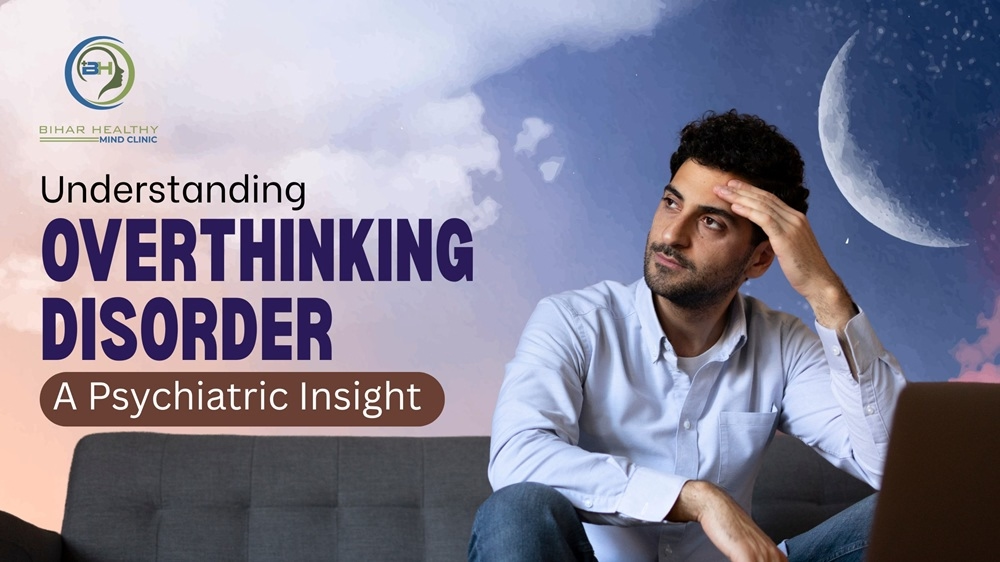
Overthinking is often dismissed as a harmless habit. However, when persistent, it can interfere with daily life, relationships, and even sleep. Many people wonder: Is overthinking a sign of anxiety or depression? In clinical settings, this pattern is often referred to as an overthinking disorder, a non-clinical but widely understood term describing the obsessive, repetitive, and unproductive thought cycles that are commonly associated with mental health conditions.
At Patna Psychiatry, Dr. Saurabh Kumar, MD (Psychiatry), offers evidence-based treatment for various mental health concerns, including anxiety, depression, and cognitive disorders. Through his expert guidance, patients often discover the hidden roots behind their overthinking patterns and receive personalized care that brings lasting relief.
What Is Overthinking Disorder?
While “overthinking disorder” is not a formal diagnosis in the DSM-5 (Diagnostic and Statistical Manual of Mental Disorders), the term is increasingly used to describe chronic rumination and obsessive worry that significantly impacts one’s well-being. It is a lay term that typically reflects the cognitive symptoms associated with:
- Generalized Anxiety Disorder (GAD)
- Major Depressive Disorder (MDD)
- Obsessive-Compulsive Disorder (OCD)
- Social Anxiety Disorder
- Panic Disorder
People with an overthinking disorder often replay past conversations, analyze outcomes repeatedly, and worry excessively about the future. This cognitive overload can lead to physical symptoms like headaches, fatigue, and insomnia, creating a vicious cycle that further exacerbates anxiety or depression.
Is Overthinking a Sign of Anxiety?
Overthinking is a prominent feature of anxiety conditions, particularly Generalized Anxiety Disorder (GAD). Individuals with anxiety often engage in "what if" scenarios and fear potential negative outcomes. Their minds are constantly on high alert, preparing for a future threat, even when none exists.
Symptoms of anxiety-driven overthinking include:
- Constant worry or dread
- Difficulty concentrating
- Sleep disturbances
- Physical restlessness
- Muscle tension
In such cases, overthinking serves as a coping mechanism to gain control over uncertainty. However, it usually backfires, leading to heightened stress.
Can Overthinking Indicate Depression?
Yes, overthinking is also common among individuals with depression. In depressive states, overthinking tends to center around the past—mistakes, regrets, failures, or perceived inadequacies. Continuously dwelling on the same thoughts can worsen feelings of hopelessness and lead to a poor self-image.
Signs of depression-related overthinking include:
- Feelings of worthlessness or guilt
- Loss of interest in daily activities
- Fatigue or low energy
- Persistent sadness
- Suicidal thoughts in severe cases
If overthinking is accompanied by a consistently low mood and lack of motivation, it’s crucial to seek psychiatric evaluation.
Why Professional Help Is Essential
Whether linked to anxiety, depression, or another condition, chronic overthinking shouldn’t be ignored. Early intervention prevents complications and improves quality of life. At Patna Psychiatry, Dr. Saurabh Kumar, often regarded as the best psychiatrist in Patna, employs a combination of psychotherapy, medication, and cognitive-behavioral techniques to treat overthinking disorder and its underlying causes.
Treatment options may include:
- Cognitive Behavioral Therapy (CBT): Assists in recognizing and reshaping harmful thinking habits.
- Mindfulness and Relaxation Techniques: Reduce the intensity and frequency of intrusive thoughts.
- Medications: Antidepressants or anti-anxiety medications can be prescribed depending on the diagnosis.
- Lifestyle Modifications: Structured routines, exercise, and proper sleep hygiene.
Self-Help Tips for Managing Overthinking
While professional guidance is vital, some strategies can help reduce overthinking on a daily basis:
- Set Time Limits for Decisions: Avoid analysis paralysis by limiting decision-making time.
- Practice Mindfulness: Engage in mindfulness techniques to stay grounded in the present and ease feelings of stress or worry.
- Keep a Thought Journal: Writing down thoughts helps to release mental clutter.
- Engage in Physical Activity: Exercise is a natural stress-reliever.
- Challenge Negative Beliefs: Ask yourself if your worries are realistic or exaggerated.
When to Seek Help
If overthinking begins to disrupt your daily routine, work, relationships, or mental peace, it’s time to consult a professional. Left untreated, chronic overthinking may worsen and lead to more serious psychiatric issues.
At Patna Psychiatry, we provide compassionate, confidential, and comprehensive mental health care tailored to your needs. Dr. Saurabh Kumar’s expertise in treating thought disorders ensures that you receive the best possible support on your path to recovery.
Final Thoughts
Overthinking is more than just a habit, it can be a sign of deeper emotional distress. Whether it's rooted in anxiety, depression, or another condition, understanding and addressing overthinking disorder is essential for mental well-being.
If you're struggling with constant mental chatter, intrusive thoughts, or decision fatigue, don’t suffer in silence. If you're seeking dependable psychiatric evaluation and complete care, Dr. Saurabh Kumar at Patna Psychiatry, often regarded as the best psychiatrist in Patna, can provide expert support.
Disclaimer: All characters and events depicted in this blog are entirely fictional. Any resemblance to actual persons, living or dead, is purely coincidental. The content is intended for informational purposes only and should not be considered as medical advice. Always consult a qualified healthcare professional for medical concerns.
Visitors: 213





No comments yet.